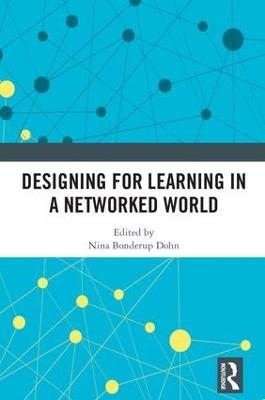
Designing for Learning in a Networked World
Routledge (Verlag)
978-0-8153-7843-3 (ISBN)
The book clarifies the different conceptions of design within the educational field and offers a framework for thinking critically about instances of networked learning. It analyses digital and Computational Literacy and discusses participatory skills for learning in a networked world. Examples of specific empirical cases include teaching programming to students not necessarily intrinsically motivated to learn; facilitation of a participatory public in the library and designs for children’s transition from day-care to primary school, discussed as a matter of networked contexts.
Engaging thoughtfully with the question of ‘21st century skills’, this book will be vital reading to scholars, researchers and students within the fields of education, networked learning, learning technology and the learning sciences, digital literacy, design for learning, and library studies.
Nina Bonderup Dohn is Associate Professor in the Department of Design and Communication at the University of Southern Denmark.
Part 1. Common framework
Chapter 1. Introduction: competence demands in today's networked world
Chapter 2. Design in educational research – clarifying conceptions and presuppositions
Chapter 3. Networked learning in a networked world
Chapter 4. Assessing network technologies for learning
Part 2. Skills for a networked world
Chapter 5. Teaching in a networked world – skills, knowledge and beliefs
Chapter 6. Participatory skills for learning in a networked world
Chapter 7. Facilitating participation: Redefinition of library competence in a networked world
Chapter 8. Digital literacy – cognitive strategies, genre skills and situated practice
Chapter 9. Computational Literacy skill set – an incremental approach
Part 3. Case studies: designing for developing skills in a networked world
Chapter 10. Guided tinkering as a design for learning programming
Chapter 11. Designing for transition from day-care to school
Chapter 12. Design principles for designing simulated social practices
Chapter 13. Guidance practices for citizens’ interactions with e-government solutions
Chapter 14. Intermediaries and intermediating tools as instruments for digital literacy in Bangladesh
Chapter 15. Conclusion: designing for learning in a networked world
| Erscheinungsdatum | 16.04.2018 |
|---|---|
| Reihe/Serie | Routledge Research in Education |
| Zusatzinfo | 24 Tables, black and white; 41 Halftones, black and white |
| Verlagsort | New York |
| Sprache | englisch |
| Maße | 156 x 234 mm |
| Gewicht | 582 g |
| Themenwelt | Schulbuch / Wörterbuch ► Unterrichtsvorbereitung ► Unterrichts-Handreichungen |
| Sozialwissenschaften ► Pädagogik | |
| ISBN-10 | 0-8153-7843-2 / 0815378432 |
| ISBN-13 | 978-0-8153-7843-3 / 9780815378433 |
| Zustand | Neuware |
| Haben Sie eine Frage zum Produkt? |
aus dem Bereich


